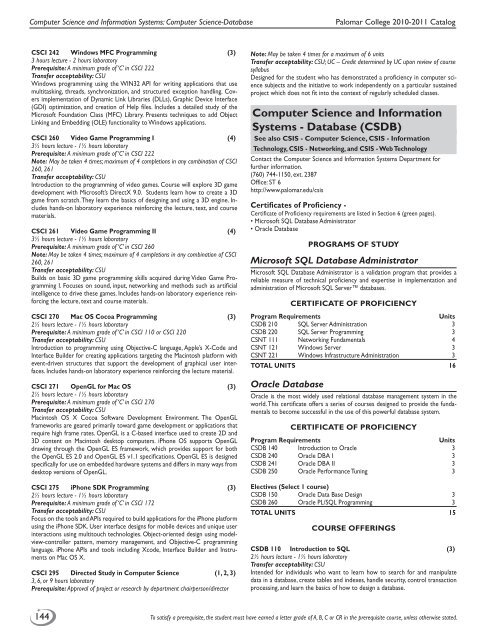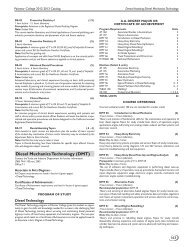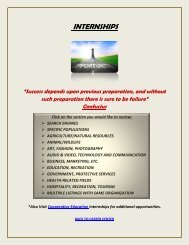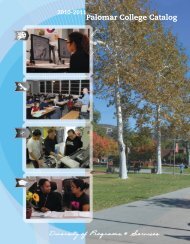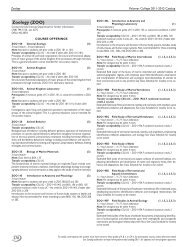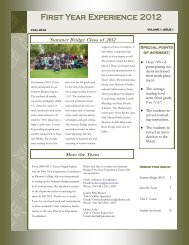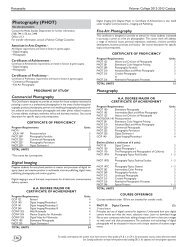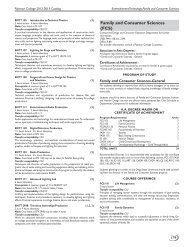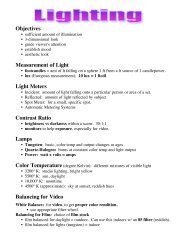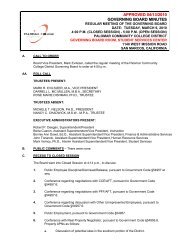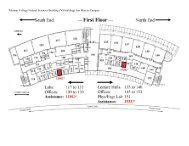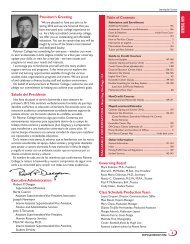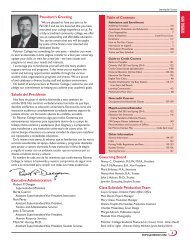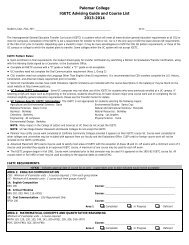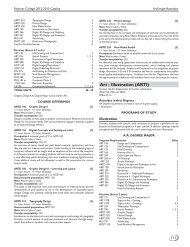Download the complete catalog - Palomar College
Download the complete catalog - Palomar College
Download the complete catalog - Palomar College
You also want an ePaper? Increase the reach of your titles
YUMPU automatically turns print PDFs into web optimized ePapers that Google loves.
Computer Science and Information Systems: Computer Science-Database<br />
<strong>Palomar</strong> <strong>College</strong> 2010-2011 Catalog<br />
CSCI 242 Windows MFC Programming (3)<br />
3 hours lecture - 2 hours laboratory<br />
Prerequisite: A minimum grade of ‘C’ in CSCI 222<br />
Transfer acceptability: CSU<br />
Windows programming using <strong>the</strong> WIN32 API for writing applications that use<br />
multitasking, threads, synchronization, and structured exception handling. Covers<br />
implementation of Dynamic Link Libraries (DLLs), Graphic Device Interface<br />
(GDI) optimization, and creation of Help files. Includes a detailed study of <strong>the</strong><br />
Microsoft Foundation Class (MFC) Library. Presents techniques to add Object<br />
Linking and Embedding (OLE) functionality to Windows applications.<br />
CSCI 260 Video Game Programming I (4)<br />
3½ hours lecture - 1½ hours laboratory<br />
Prerequisite: A minimum grade of ‘C’ in CSCI 222<br />
Note: May be taken 4 times; maximum of 4 completions in any combination of CSCI<br />
260, 261<br />
Transfer acceptability: CSU<br />
Introduction to <strong>the</strong> programming of video games. Course will explore 3D game<br />
development with Microsoft’s DirectX 9.0. Students learn how to create a 3D<br />
game from scratch. They learn <strong>the</strong> basics of designing and using a 3D engine. Includes<br />
hands-on laboratory experience reinforcing <strong>the</strong> lecture, text, and course<br />
materials.<br />
CSCI 261 Video Game Programming II (4)<br />
3½ hours lecture - 1½ hours laboratory<br />
Prerequisite: A minimum grade of ‘C’ in CSCI 260<br />
Note: May be taken 4 times; maximum of 4 completions in any combination of CSCI<br />
260, 261<br />
Transfer acceptability: CSU<br />
Builds on basic 3D game programming skills acquired during Video Game Programming<br />
I. Focuses on sound, input, networking and methods such as artificial<br />
intelligence to drive <strong>the</strong>se games. Includes hands-on laboratory experience reinforcing<br />
<strong>the</strong> lecture, text and course materials.<br />
CSCI 270 Mac OS Cocoa Programming (3)<br />
2½ hours lecture - 1½ hours laboratory<br />
Prerequisite: A minimum grade of ‘C’ in CSCI 110 or CSCI 220<br />
Transfer acceptability: CSU<br />
Introduction to programming using Objective-C language, Apple’s X-Code and<br />
Interface Builder for creating applications targeting <strong>the</strong> Macintosh platform with<br />
event-driven structures that support <strong>the</strong> development of graphical user interfaces.<br />
Includes hands-on laboratory experience reinforcing <strong>the</strong> lecture material.<br />
CSCI 271 OpenGL for Mac OS (3)<br />
2½ hours lecture - 1½ hours laboratory<br />
Prerequisite: A minimum grade of ‘C’ in CSCI 270<br />
Transfer acceptability: CSU<br />
Macintosh OS X Cocoa Software Development Environment. The OpenGL<br />
frameworks are geared primarily toward game development or applications that<br />
require high frame rates. OpenGL is a C-based interface used to create 2D and<br />
3D content on Macintosh desktop computers. iPhone OS supports OpenGL<br />
drawing through <strong>the</strong> OpenGL ES framework, which provides support for both<br />
<strong>the</strong> OpenGL ES 2.0 and OpenGL ES v1.1 specifications. OpenGL ES is designed<br />
specifically for use on embedded hardware systems and differs in many ways from<br />
desktop versions of OpenGL.<br />
CSCI 275 iPhone SDK Programming (3)<br />
2½ hours lecture - 1½ hours laboratory<br />
Prerequisite: A minimum grade of ‘C’ in CSCI 172<br />
Transfer acceptability: CSU<br />
Focus on <strong>the</strong> tools and APIs required to build applications for <strong>the</strong> iPhone platform<br />
using <strong>the</strong> iPhone SDK. User interface designs for mobile devices and unique user<br />
interactions using multitouch technologies. Object-oriented design using modelview-controller<br />
pattern, memory management, and Objective-C programming<br />
language. iPhone APIs and tools including Xcode, Interface Builder and Instruments<br />
on Mac OS X.<br />
CSCI 295 Directed Study in Computer Science (1, 2, 3)<br />
3, 6, or 9 hours laboratory<br />
Prerequisite: Approval of project or research by department chairperson/director<br />
Note: May be taken 4 times for a maximum of 6 units<br />
Transfer acceptability: CSU; UC – Credit determined by UC upon review of course<br />
syllabus<br />
Designed for <strong>the</strong> student who has demonstrated a proficiency in computer science<br />
subjects and <strong>the</strong> initiative to work independently on a particular sustained<br />
project which does not fit into <strong>the</strong> context of regularly scheduled classes.<br />
Computer Science and Information<br />
Systems - Database (CSDB)<br />
See also CSIS - Computer Science, CSIS - Information<br />
Technology, CSIS - Networking, and CSIS - Web Technology<br />
Contact <strong>the</strong> Computer Science and Information Systems Department for<br />
fur<strong>the</strong>r information.<br />
(760) 744-1150, ext. 2387<br />
Office: ST 6<br />
http://www.palomar.edu/csis<br />
Certificates of Proficiency -<br />
Certificate of Proficiency requirements are listed in Section 6 (green pages).<br />
• Microsoft SQL Database Administrator<br />
• Oracle Database<br />
PROGRAMS OF STUDY<br />
Microsoft SQL Database Administrator<br />
Microsoft SQL Database Administrator is a validation program that provides a<br />
reliable measure of technical proficiency and expertise in implementation and<br />
administration of Microsoft SQL Server databases.<br />
Certificate of Proficiency<br />
Program Requirements<br />
Units<br />
CSDB 210 SQL Server Administration 3<br />
CSDB 220 SQL Server Programming 3<br />
CSNT 111 Networking Fundamentals 4<br />
CSNT 121 Windows Server 3<br />
CSNT 221 Windows Infrastructure Administration 3<br />
TOTAL UNITS 16<br />
Oracle Database<br />
Oracle is <strong>the</strong> most widely used relational database management system in <strong>the</strong><br />
world. This certificate offers a series of courses designed to provide <strong>the</strong> fundamentals<br />
to become successful in <strong>the</strong> use of this powerful database system.<br />
Certificate of Proficiency<br />
Program Requirements<br />
Units<br />
CSDB 140 Introduction to Oracle 3<br />
CSDB 240 Oracle DBA I 3<br />
CSDB 241 Oracle DBA II 3<br />
CSDB 250 Oracle Performance Tuning 3<br />
Electives (Select 1 course)<br />
CSDB 150 Oracle Data Base Design 3<br />
CSDB 260 Oracle PL/SQL Programming 3<br />
TOTAL UNITS 15<br />
COURSE OFFERINGS<br />
CSDB 110 Introduction to SQL (3)<br />
2½ hours lecture - 1½ hours laboratory<br />
Transfer acceptability: CSU<br />
Intended for individuals who want to learn how to search for and manipulate<br />
data in a database, create tables and indexes, handle security, control transaction<br />
processing, and learn <strong>the</strong> basics of how to design a database.<br />
144 To satisfy a prerequisite, <strong>the</strong> student must have earned a letter grade of A, B, C or CR in <strong>the</strong> prerequisite course, unless o<strong>the</strong>rwise stated.


